On the fourth day of practice for a new Little League taking root in Englewood this spring, the grass in Hamilton Park was finally mowed. The five clay diamonds were raked and crisp white foul lines drawn in chalk, just in time to be trampled by the flood of children exiting the park’s field house.
“How many of you have been stopped by the police?” Marco Johnson asked the group of kids surrounding him as he stood on second base. Most hands went up. The light was fading fast, and this was Johnson’s final speech of the day. After nearly two hours of practice, the kids were tired and ready to go home. Someone in the back questioned why he was asking, then doubted his credentials. “You ain’t the police!” After nearly thirty years as a cop, Johnson retired a few years ago. From the experience he’s gained mentoring kids since then, he knew exactly how to respond.
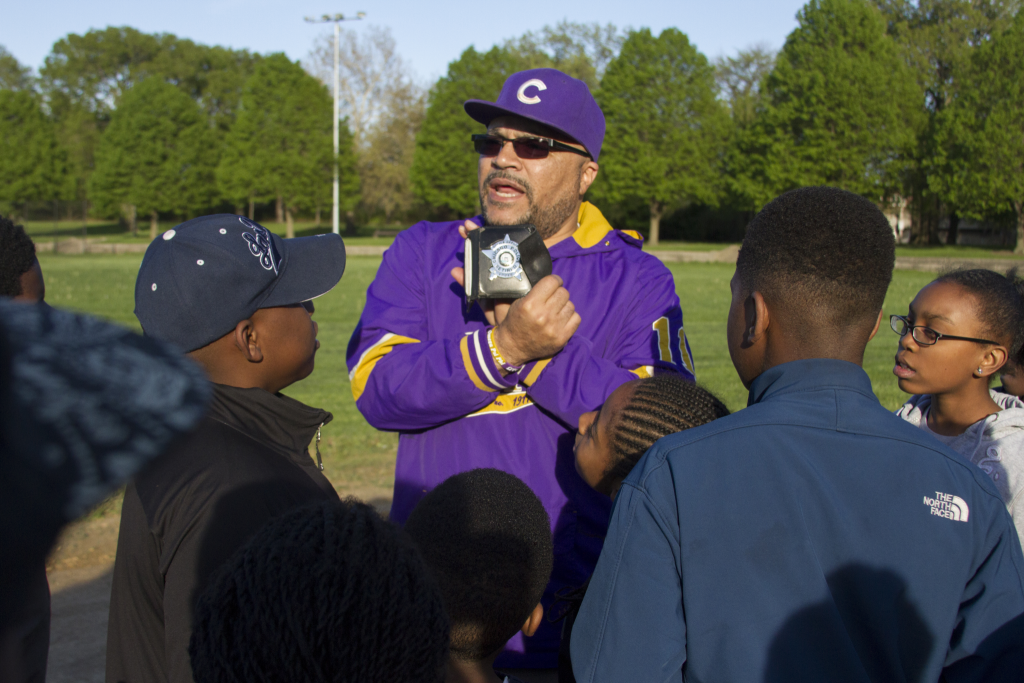
He swiftly pulled out his badge, which flashed in the light of the setting sun. “How much you wanna bet?” he dared. No one replied.
The new league’s organizers have somewhat miraculously signed up more than one hundred enthusiastic children to play baseball in a neighborhood where basketball and football reign supreme. The league, however, is neither the work of upstart parents nor the natural result of kids getting interested in baseball on their own.
Instead, it’s part of an experiment that the Chicago Police Department is participating in: community engagement through baseball. Through a partnership with Teamwork Englewood, a community center on 63rd and Halsted, and Get IN Chicago, a nonprofit incubator launched by the mayor’s office to pursue “sustainable reductions in violence for individuals and communities,” the program enlists active and retired CPD officers to coach the Little League teams.
Johnson talks a lot about the importance of authority, whether it comes from a parent, a teacher, or an officer. He went over how to answer an officer’s questions during a police stop, implying that truthful answers are all it takes to get off scot-free. “You’ve got the lead police officer in this area standing right here with you,” Johnson said, gesturing to Larry Watson, Englewood’s District Commander. “I’m sure he’s not gonna let his men treat you wrong.”
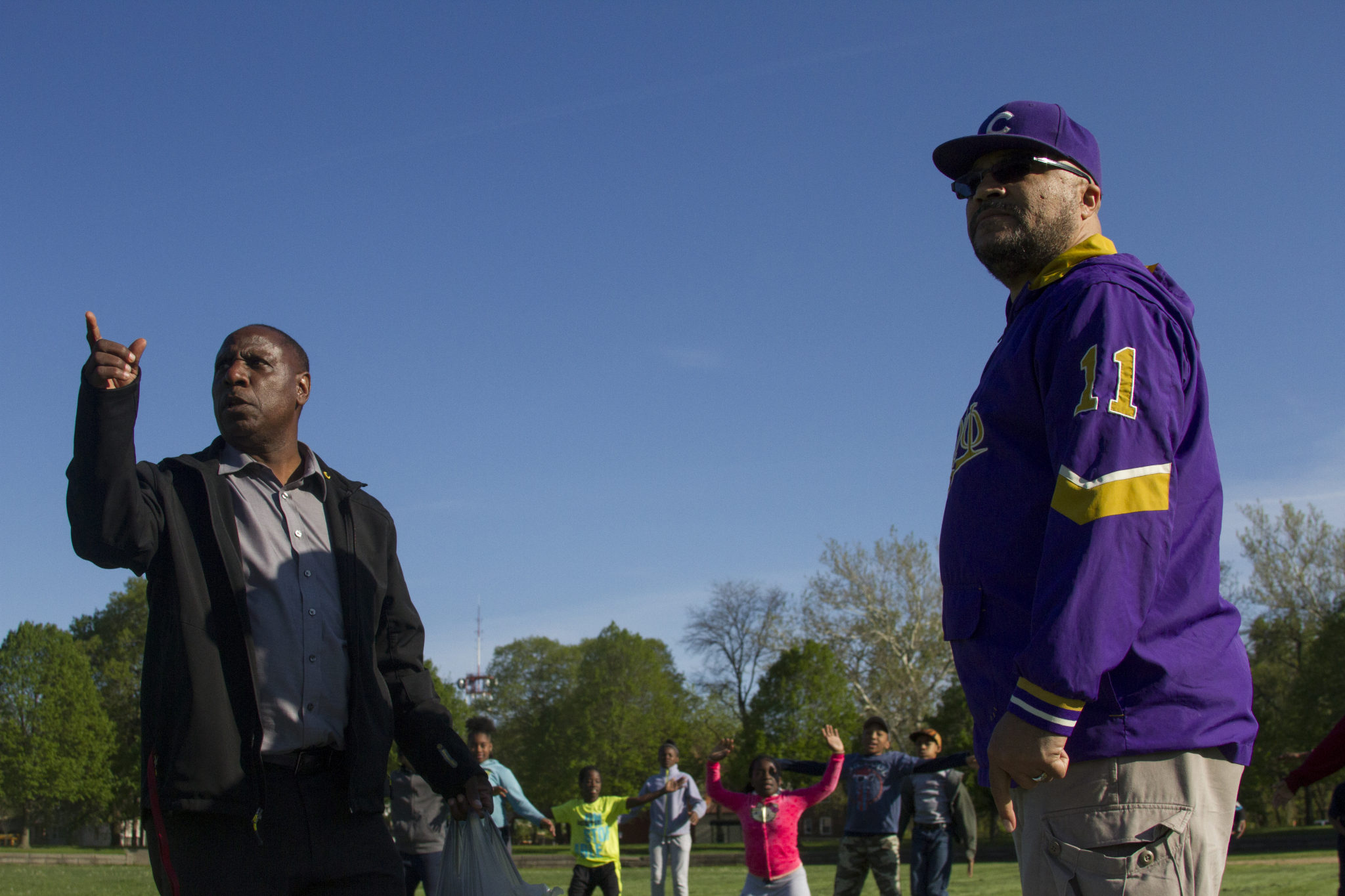
“This, on defense, is your heart and soul,” said another one of the coaches. “This is a baseball glove.” Most of the kids participating in the league had never played the sport before, so the officers had to start with the basics. Baseball’s reputation as the quintessential American sport has never been more in question, and in Englewood the sport commands just a fraction of the social and cultural value it did when Johnson was growing up. Declining numbers of black Major Leaguers may have something to do with it, as the absence of black superstars like Hank Aaron has made it harder for Englewood’s children to see a reflection of themselves at baseball’s highest level. The sport’s status on the South Side was elevated slightly this past year with the rise (and eventual fall) of the Jackie Robinson West team that captured the attention of the country before reports of district gerrymandering surfaced.
“It does a lot to see someone who looks like you, who’s your age, on TV giving interviews and stuff,” Watson said.
The current state of the sport is a far cry from what it was during Watson’s childhood, which he spent watching the Cubs, playing baseball, and idolizing Ernie Banks. He’s a product of Kershaw, an elementary school about ten blocks north of where he now crouched in the park’s grass, running after wiffle balls in full uniform.
Many of the coaches that day were Watson’s officers. “A lot of these guys work overnights,” he said. “But they’re taking their free time to come here and work with the kids.” Watson’s hope is that officers will eventually be able to “walk down the street and say, ‘hey, I know him and him and her.’” The goal is to build community, but whether the police fall within the bounds of the Englewood community is unclear.
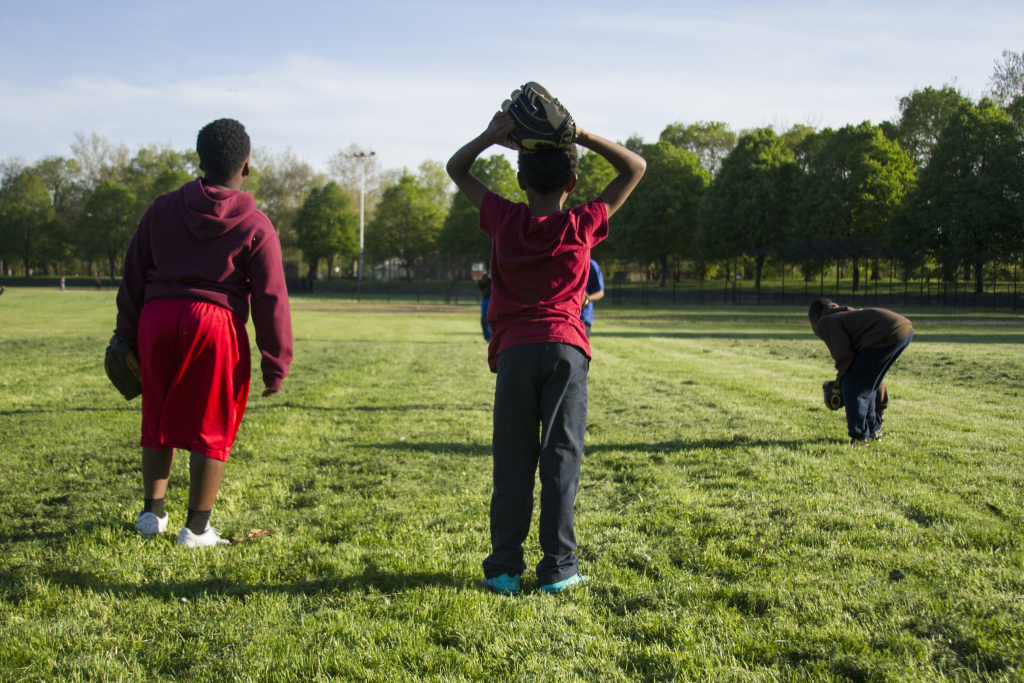
“Police officers help keep me safe,” the first statement on the survey read. A ten-year-old girl looked over the boxes that followed and wrote a checkmark in the box labeled “Strongly Agree.” I was sitting in the back of the field house’s auditorium with her at the program’s orientation the week before. Like around half of the league’s players, she lives in Englewood and goes to school close by. We listened as Glen Brooks, the CPD’s coordinator on the South Side, spoke about the program. “Be safe, and have fun,” he said at the end of his speech. She said she had never played baseball, but that she was excited. The reason she signed up? “Mostly, my mom wanted to get photos of me in my baseball stuff.”
The survey is part of the performance-based evaluation that Get IN Chicago is conducting on the program, examining exactly what kids think about the police. “In Englewood, things happen,” she said after I asked her more about her experience with law enforcement. She says she was taught to call 911 after her first birthday and that she saw a car blow up on her block at the age of four. Does she ever talk about the police with her parents or friends? Not really, she says. As with many of the kids there, contact with the police in a friendly context was a new experience.
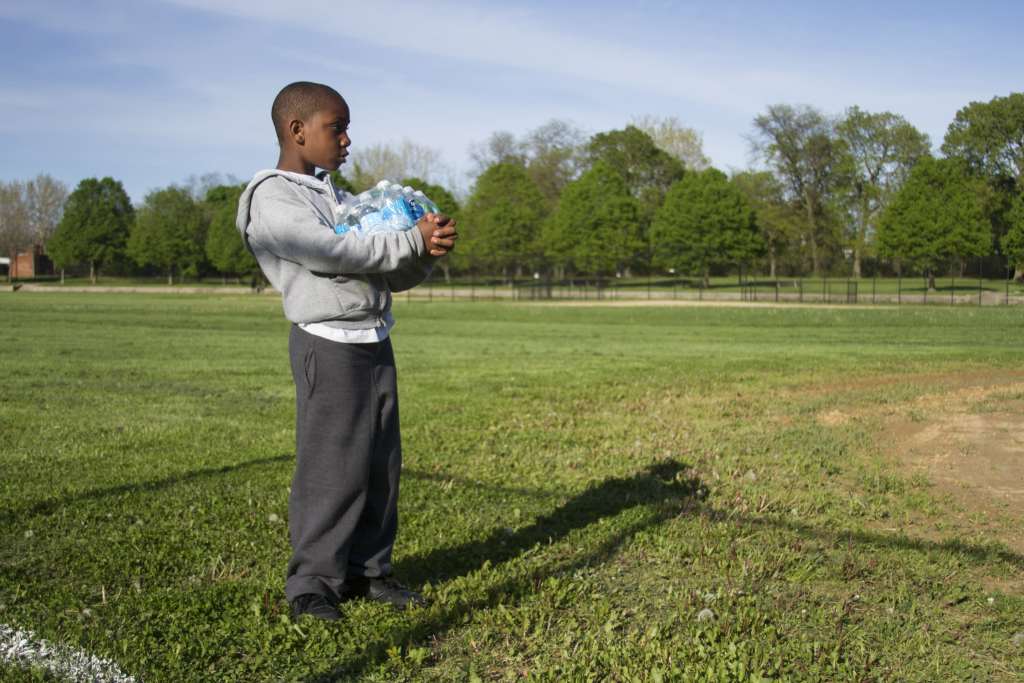
“We’re trying to change the dialogue that surrounds police involvement with the community,” said Crystal Jackson of Get IN Chicago, the organization providing funding for the program. The point is essentially to encourage the kids, as well as the officers, to redefine the boundaries of their respective communities in the hopes that the personal connections created on the field, with what Watson calls “positive contact,” translate to the streets of the neighborhood.
“It isn’t just the police here,” Brooks said. “This is the community coming together, and the police are part of the community.” The Police Department has long attempted to place officers firmly within the bounds of what Chicagoans consider their communities. The Chicago Alternative Policing Strategy, or CAPS, was revolutionary in its emphasis on cooperation when it was introduced in 1993. Allowing civilians to attend police meetings and contribute to the safety of their communities, CAPS was hailed as a minor revolution in the field of crime reduction.
“No matter what you hear on TV, we’re your friends,” Johnson pleaded with the thirty kids that surrounded him, taking a break from his old school, tough-love coaching style. “Without us, you guys can’t come over here and play in the park without worrying about somebody jumping on you.”
Noticeably absent from this portrayal of police officers as protective, paternal figures, however, is an acknowledgement that the opinions of many on the South Side are shaped by the very real experiences of stops, arrests, and shootings. Kids in Englewood experience the police largely in a negative context: a review of the CPD’s contact card database earlier this year found that black people in Chicago are the subject of around seventy-two percent of all stop-and-frisks despite only making up thirty-two percent of the city’s population. Two of Chicago’s three police-involved shootings in the first quarter of this year took place in Englewood. Johnson’s admission that “there are some bad cops” fails to acknowledge these disproportions.
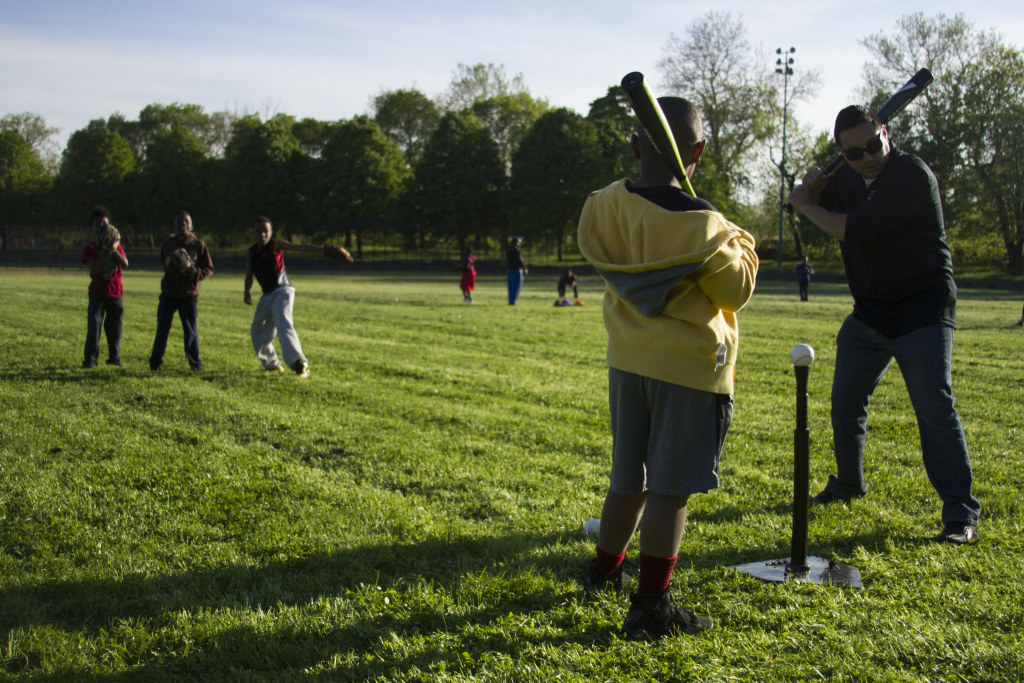
As the league wrestles with the question of how to frame police involvement in Englewood, it will ultimately be the task of each child to reconcile promises of protection from their coaches with their personal experiences of policing and with depictions of law enforcement in the news media.
The league may turn out to be nothing more than a photo opportunity for the Police Department’s press office, or simply another community engagement program that the aldermen who speak at the league’s opening day June 24 can take credit for. But another measure of success, the league’s organizers say, will be a second survey conducted at the end of the summer, likely asking the kids similar questions about their confidence in Englewood’s law enforcement. A positive result would lead the program to much acclaim and more funding.
The first practices of the Little League felt like reclamation—the chance to take ownership of the five underused fields in Hamilton Park, and an opportunity to repossess the sport of baseball, so much a part of black Chicago’s history. It may take far longer for Englewood’s residents to reclaim that same sense of ownership and trust in their law enforcement, to feel as if the police officers who moonlight as baseball coaches are truly a part of their community. After all, the season is only a few months long.

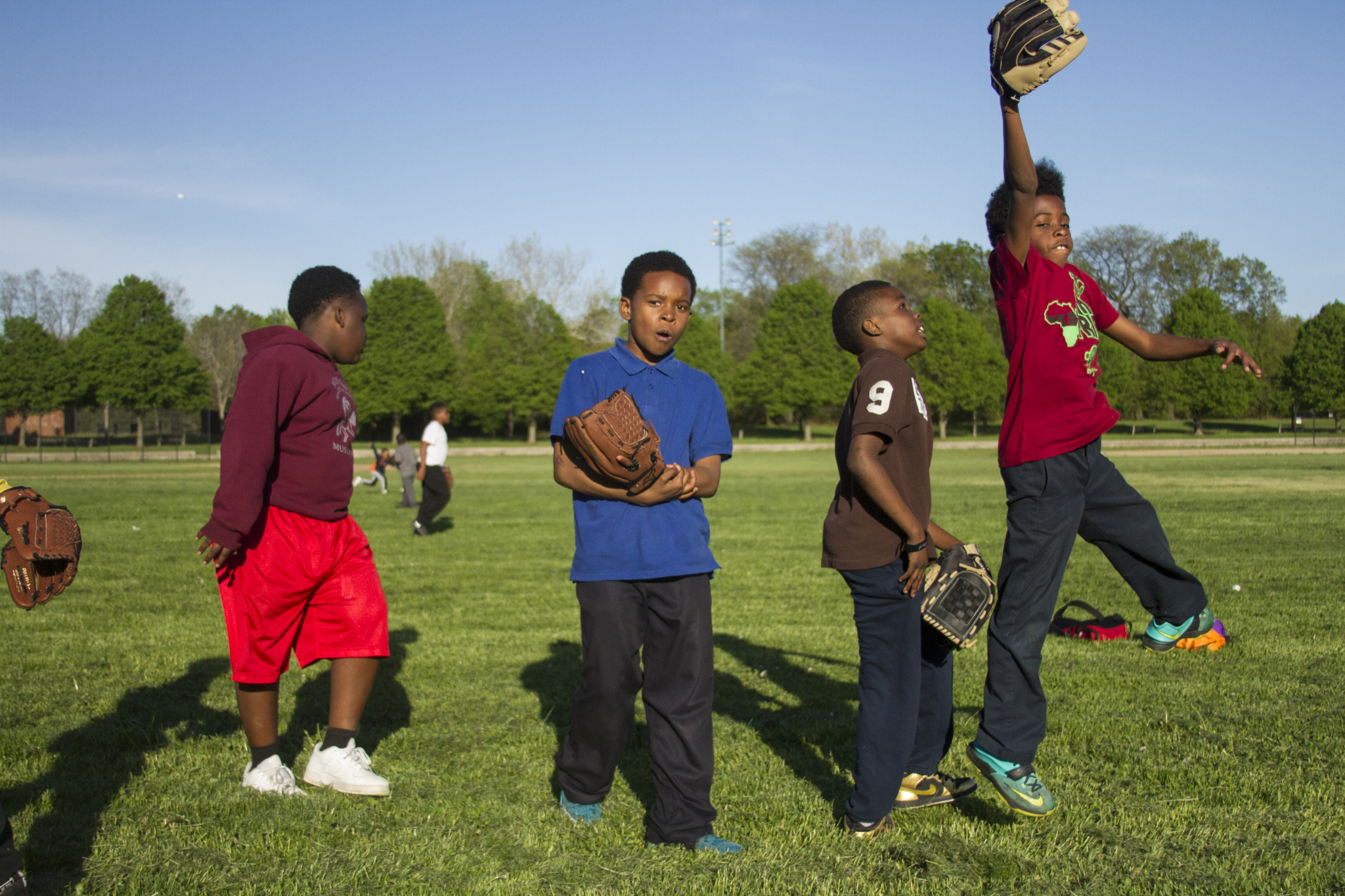
Gr8 Job!